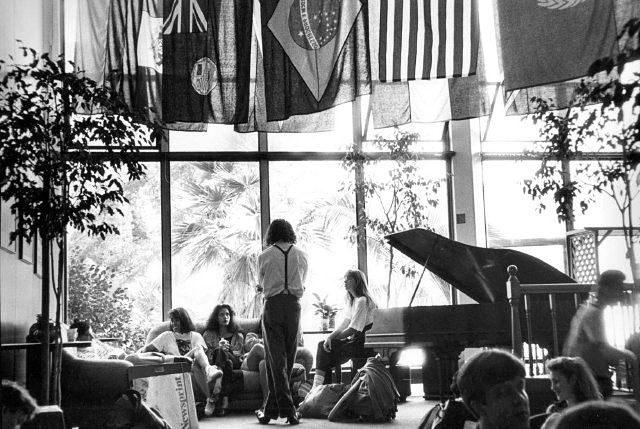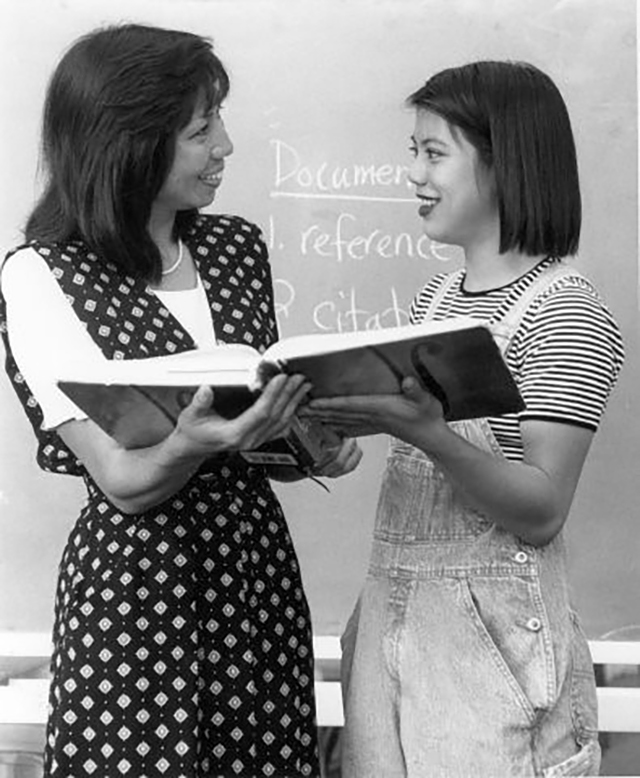Espresso comes to CSM
Student-run Café International poured the campus’ first espresso in 1989 and served up coffee and community for more than 25 years
It’s hard to imagine getting through college without coffee. Yet the gourmet coffee and espresso drinks that fuel student lives today didn’t come to College of San Mateo until 1989—thanks to a student whose Café International became one of the longest-lived student-run enterprises in campus history. Café International served up espresso, pastry and live music for more than 25 years.
The café was founded by Karl Ferguson, a sophomore from Del Mar who missed the espresso he drank in coffeehouses back home and even more the ambiance that college coffeehouses offered. Joining the ASCSM Senate as a way to meet people, Ferguson pitched his café idea to student government and to college President Lois Callahan, who approved use of a small room off the cafeteria (then in Building 5).
Ferguson, now a general contractor in Trinidad, Calif., launched a five-day, proof-of-concept test in April 1988. His pop-up Café International did $250 in business during its first six hours. By the end of the five-day trial, it had cleared $2,500.
This despite the room’s initial lack of running water or a 220-volt outlet for the espresso machine—just a 110V outlet that allowed baristas to pull one cup of espresso at a time instead of two.
Callahan gave a permanent café the green light and contributed start-up funds. Ferguson spent a campus break remodeling the room himself. Horticulture students donated plants. The Art Department decorated the space. Campus ethnic clubs supplied specialty desserts. The café’s namesake flags were donated by CSM’s international students.
“We had five people working 48 hours straight, no sleep, to get everything together, and we never looked back,” co-founder Linda Kiely told the campus San Matean soon after the March 6, 1989 opening.
Nationally, many student-run enterprises lose momentum after the founders move on. Café International, though, flew from strength to strength.
By chance, the café opened during a labor dispute that closed the cafeterias at all three campuses in the San Mateo County Community College District. For nearly two years, Café International was the only place at CSM to get food that wasn’t out of a vending machine.


Within its first year, the café upgraded three times. Its first espresso machine could produce two drinks at a time. Its second produced four. Ten months after opening, the café reinvested profits in a $6,384 Italian machine that could pull nine espressos simultaneously.
“It’s still like a baby, still growing,” employee Luz Palacios said in October 1990. Maybe we’ll have track lighting, maybe barstools someday ...”
Café International provided cutting-edge job experience years before specialty coffee could be found on seemingly every corner and before “barista” was a household word. In addition to espresso making, students learned management, entertainment booking and procurement. They always found new ways to upgrade menu or décor and otherwise make the café their own.
Though patrons asked for items like yogurt or soup, the café was initially forbidden by the district’s union contract to sell any food the cafeteria normally sold.
Ferguson deplores that the café was seen by some as a wedge in contract talks.
“I’m a very liberal union supporter,” he said.
“To me, the most important thing about Café International was for students to improve the college and the college atmosphere,” he said. “If the college were to open the coffeehouse, it would have taken years.”
Café International survived as a student-run enterprise until the late 2000s, when its venue was demolished to make way for today’s Health and Wellness Building. Today, Paws for Coffee in Building 10, the Student Center, supplies CSM’s specialty coffee needs.
Ferguson graduated in legal studies from UC Berkeley and moved to Humboldt County. With his wife, architect Danny Ferguson, he renovates homes on the North Coast. He still keeps a scrapbook of his CSM life.
“I’m a huge advocate of community colleges,” he said. “You can explore your options and then, if you want to go to a four-year college, the community college can get you to the college you want to go to. For me and for a lot of other people, a place like CSM was the best place.”

